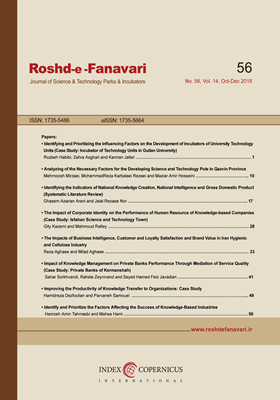Identify and Prioritize the Factors Affecting the Success of Knowledge-Based Industries
Subject Areas :
Hamzeh Amin-Tahmasbi
1
![]() ,
Mahsa Hami
2
,
Mahsa Hami
2
1 - Assistant Prof. Department of Industrial Engineering, Faculty of Technology and Engineering, East of Guilan, University of Guilan, Iran
2 -
Abstract :
One of the tools for knowledge management is the creation of knowledge-based companies that play a very important role in the countries’ economic development. In fact, a knowledge-based company is a private or cooperative company or institution whose purpose is to create and expand the combination of science and wealth and the development of a knowledge-based economy, which result is the creation of wealth and the development of the economy through the expansion and application of invention and innovation through the commercialization of research and development activities. Given the importance and impact of knowledge-based industries in the current economy, this study will identify and prioritize factors affecting the success of these industries. In order to identify these factors, literature and current research were collected and written. Then, by distributing the questionnaire among the managers and experts of the companies present in the science and technology park of Guilan province, the most important factors were identified. In the next step, according to the obtained information, another questionnaire was developed that measured the criteria by using a pair comparison. DEMATEL method has been used to rank the identified factors, and due to the uncertainty in experts' opinions, evaluation is done in a fuzzy environment. As a result of the evaluation, it was found that environmental factors play the most important role in the growth and development of knowledge-based companies. Among the sub-criteria of environmental factors, government policies, tax exemptions and customs were identified as the most effective factors in the success of knowledge-based companies. Therefore, it is imperative that the senior decision makers provide incentives and regulations to create a suitable business environment.
1- الوانی، سیدمهدی. خطمشی دانشآفرین؛ ضرورت بقا در سازمانهای امروز، مجله مجلس و پژوهش، سال دهم، شماره 41، 1382.
2- حقی، محبوبه. راستی بزرگی، مرتضی. مهدوی، حمید. رتبهبندی عوامل مؤثر در موفقیت اجرای مدیریت دانش در شرکتهای دانشبنیان، مطالعه موردی: شرکتهای دانشبنیان مستقر در شهرک علمی و تحقیقاتی اصفهان، فصلنامه رشد فناوری، سال یازدهم، شماره 41، صص. 58-52، 1393.
3- حیدری تفرشی، غلامحسین. نگرشی نوین به نظریات سازمان و مدیریت در جهان امروز. تهران، نشر فراشناختی اندیشه، 1391.
4- مهدوی، حمید. شیخ زینالدین، محمود. خدابنده، لیلا. تحلیل اثربخشی پارکهای علم و فناوری به کمک نتایج فرایند ارزیابی شرکتهای دانشبنیان مستقر در پارکهای علم و فناوری، فصلنامه رشد فناوری، سال هفتم، شماره 27، صص. 60-53، 1390.
5- امامقلیزاده، فلاح. صابر. رضوی حمیدرضا. نقش جدید دانشگاهها: ایجاد و توسعه SMEهای دانشبنیان، همایش ملی دانشگاه کارآفرین (صنعت دانشمحور)، دانشگاه مازندران، صص. 15-1، 1389.
6- ضیایی، مظاهر. اهمیت تعدد و تنوع منابع در موفقیت فرایند ایجاد شرکتهای زایشی پژوهشی، فصلنامه تخصصی رشد فناوری، سال هشتم، شماره 32، 1391.
7- کدخداپور، حامد. نقشه مدیریت دانش در چابکی سازمانهای تجاری (مدلیابی معادلات ساختاری)؛ مطالعه موردی: شرکتهای دانشمحور پارک علموفناوری شهرستان یزد، مؤسسه آموزش عالی جهاد دانشگاهی استان یزد، صص. 70-64، 1392.
8- میرغفوری، سیدحبیبالله. صیادی توانلو، حسین. کریمینیا، مریم. رتبهبندی عوامل مؤثر بر ارتقا نوآوری در شرکتهای وابسته به مراکز رشد با استفاده از فن تاپسیس فازی؛ مطالعه موری پارک علم و فناوری یزد. رشد فناوری، فصلنامه تخصصی پارکها و مراکز رشد، سال نهم، شماره 26، صص. 28-19، 1392.
9- باباخانیان، مهدی. شناسایی عوامل زمینهای مؤثر بر راهاندازی شرکتهای زایشی، مطالعه موردی: شرکتهای زایشی مستقر در پارکهای علم و فناوری استان تهران، کنفرانس ملی رویکردهای نوین در مدیریت کسبوکار، تبریز، دانشگاه تبریز و سازمان مدیریت صنعتی، 1393.
10- تاری، مهدی. مرادی، محمود. ابراهیمپور، مصطفی. بررسی عوامل مؤثر بر رشد و موفقیت شرکتهای دانشبنیان. فصلنامه رشد فناوری، سال دوازدهم، شماره 45، صص. 44-36، 1394.
11- دانشفرد، کرماله. تحلیل عوامل مؤثر بر راهبرد استقرار شرکتهای دانشبنیان و ارائه الگوی مناسب. پژوهشهای مدیریت راهبردی، سال بیست و دوم شماره 61، صص. 53-29، 1395.
12- طیبی ابوالحسنی، سیدامیرحسین. خدابخشی، محمد. عوامل مؤثر بر ماندگاری منابع انسانی دانشی در شرکتهای دانشبنیان. فصلنامه پژوهشهای مدیریت منابع انسانی دانشگاه جامع امامحسین (ع)، سال نهم، شماره 2، (شماره پیاپی 28)، صص. 192-167، 1396.
13- Stiri, R., & Mushiri, B. Instrument for financial needed of KBI. Nat. Conf. on develop of financial needed system on Iran, Tehran, 259-296, 2009.
14- Gorman, G., McCarthy, S. Business Development Support and Knowledge-Based Businesses. J. of Technology Transfer, Vol. 31, No. 1, 131-143, 2006.
15- O’Shea, R. P., Chugh H., & Allen,T. J. Determinants and consequences of university spin off activity: A conceptual framework. Journal of Technology Transfer, 33(6), 653-666, 2008.
16- Nieves, J., Quintana, A., & Osorio, J. Knowledge- based resources and innovation in the hotel industry. International Journal of Hospitality Management, Vol. 38, 65-73, 2014.
17- Wen Chi, C,. Tien Lieu, P,. Hung, K., & Wen cheng, H. Do industry or firm effects drive performance in Taiwanese knowledge- intensive industries?. Asia Pacific Management Review, Vol. 21, Issue. 3, 170-179, 2016.
18- Dalmaro, G,. Eduardo Maehler، A,. Trevisan, M., & Mortari Schiavini, J. The use of knowledge management practices by Brazilian startup companies. Innovation & Management Review, Vol, 14, 226-234, 2017.
19- De Silva, M., & Rossi, F. The effect of firm’s relational capabilities on knowledge acquisition and co- creation with universities. Technological Forecasting and Social Change, Available online 19 March 2018.
20- Rannikko, H. Early development of new technology- based firms; A longitudinal Analysis on New Technology- Based Firms Development from Population Level and Firm Level Perspective. Hanken School of Economics, 2012.
21- Wu, W.W., & Lee, Y.T. Developing global managers’ competencies using the fuzzy DEMATEL method. Expert System with Applications, Vol. 32, Issue. 2, 499-507, 2007.
22- Hori, S., & Shimizu, Y. Designing methods of human interface for supervisory control system. Control Engineering Practice, 7(11), 1413-1419, 1999.
23- Zadeh, L. A. Fuzzy sets. Information and control, 8(3), 338-353, 1965.


